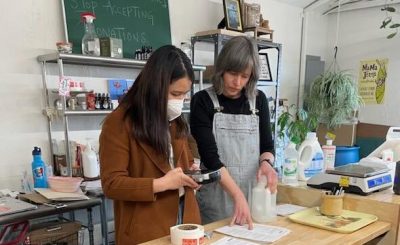Autinn Au-Yeung ’23 (Hong Kong) saw how many plastic laundry detergent bottles were in the laundry room in her dormitory – and she decided to figure out a way to use less plastic. Along with Freya Clausen ’23 from Germany and Max Sosnowski ’23 from Poland, the three students began searching for solutions and settled on bulk purchasing.
“I did a major global politics research project on bulk buying and had a connection with a supplier in Santa Fe,” Autinn said. “My passion for sustainability with bulk purchases was what got me started and developed into what it is today.” Autinn now works with Amy Harmon from Soap and Supply in Santa Fe to procure five-gallon pails of powder detergent for use in the dormitories.
In the end, this effort is a win-win: students pay less for detergent and consume less plastic. Autinn estimates that this year alone students at UWC-USA have used 240 fewer plastic laundry detergent containers. The goal is to add a nominal fee to tuition so that all students can participate in the program. They are seeking grants to support the bulk purchasing initiative and then determine how they can expand to other supplies that currently come in environmentally unfriendly packaging.
For her part, Amy Harmon is eager to help the students expand the program. “This program is experimental but also very replicable with other schools and organizations,” she said. “My challenge right now is finding distributors, local ones if possible, who can send me even larger containers of products to make it even more affordable and sustainable.”
Autinn is graduating shortly and will be attending Minerva or Cornell University in the fall. She is doing all she can to make sure that the program continues. “We have already identified two first-year students who will be continuing the project next year,” she said. “The main goal is to expand to other household products, including dish soap, all-purpose household cleaners, and dish scrubbers. I truly hope that this initiative can go on in the long term – it will not only reduce the plastic pollution we produce but also provide a more economical option for students coming from difficult financial backgrounds.”

